新目标版英语初一年级下册Unit2Whattimedoyougotoschool?(SectionA)
人教新目标七年级下册Unit2 What time do you go to school Sect

T eaching PlanUnit2What time do you go to school?SectionA1a-2dⅠ.Language goals:1.V ocabulary:dress,up,brush,tooth,shower,usually,early,station,funny,exercise2.Phrases:g e t up,dr essed up,g e t dressed,brush the teeth,take a shower,radiostation,eat breakfast3.Sentences and structures:-What time is it?-It’s…T eaching goals: T eaching important points:-What time do you usually…?-I usually….-What time d o es h e/sh e usually…?-He/She usually..(s/es)….II.Ability goals:1.T alk a bo u t routines;Ask a bo u t and say times.2.Improve the abilities of listening,speaking.3.Learn t o use the phrases and sentences of this part.III.Emotion goals:T o understand the importance of the time and making full use of time1.New words and expressions in this part.2.The routinesT eachingdifficult points:S tudents can talk a bo u t their routinesT eaching approaches: Learning T ask-based Language T eaching speaking,listeningapproaches:T eaching procedures:T eaching contents and the teacher’s activities S tudents’activitiessS tep One: Greeting1. Greet the students warmly ..2. Enjoy a son g abo u t the clock. S tep Two: Talk about time1. T: What time is it? S: It ’s eight o ’clock. (Ask several students a bo u t time.)2. Ask one student to be a clock and show us the time. S tep Three: Presentation1. -What do you usually do at 6:30? S: I usually …at …-What do I usually do at 6:30? Listen and guess. - Brush the t eethMotivate students t o g et into the class quickly.Use the new phrases to mak e sentences.2. Guess my morningListen and guess what I usually do in the morning.(get up, go t o work, g e t dressed, brush the teeth, take a shower).3. R ead the phrases loudly and r e me mber them. S tep Four: PairworkA: What time do you usually…?B: I us ually… at….Work in pairs and gr oups S tep Five: Groupworkt o practice the dialogueA: What time does he/she usually …?B: He/She usually –(s/es) up at…. S tep Six: Oral English1. I talk about my morning and then I ask students to talk about their own morning.I g e t up at 6:30. I brush my teeth at 6:35. I take a shower at 6:40. I eat breakfast at 7:00. I g e t dressed at 7:20. I go to work at 7:30. 2. Ask student to talk about Mrs W ang ’morning. Mrs Wang gets up at 6:30. She brushes the teeth at 6:35. She takes a shower at 6:40.She eats breakfast at 7:00. She getsdressed at 7:20. She g o es t o work at 7:30. S tep Seven: Listening practice1. Listen and mat ch the times with the actions. Draw lines from the clocks t o the pictures. (1b)2. Listen to the conversation. Complete the sentences.(2a)3. Listen again. Complete this shower schedule for Jim’s family.(2b)S tep Eight: ConversationS tudents can use the important sentence pattern to talk a b o u t their own morning and other ’s morningListen and fill in the blanks1R ead the conversation in2d loudly and quickly,then fill in the Discussion blanks.2.Role-playAsk two students t o imitate2d t o have an interview.Then show us it.Step Nine:Homework1.Make a survey with the drill“What time do e s your father/ mother g e t up/take a shower…?2.Design(设计)your ideal(理想的)day!Proverbs:•Time is life.R ead the conversation and give students the performanceR emember the importance of the time•Time is money.•All time is no time when it is past.•Every second counts.Unit2What time do you go to school?1.--What time do you usually ge t up?--I g e t up at6:30.2.–What time d o e s he/sh e usually g e t up/…?--He/She gets up at6:30.gets dr essedeats breakfastg o e s to workbrushes the t eeth。
新目标英语七年级下册Unit-2-What-time-do-you-go-to-school-教案

Unit 2 What time do you go to school?Section A 1 (1a-2d)一、教学目标:1. 语言知识目标:1) 能掌握以下单词:up, get up, dress, get dressed, brush, tooth (pl. teeth) brush teeth, shower, take a shower, usually, forty, fifty, wow, never, early, job, work, station, radio station, o'clock, funny, exercise能掌握以下句型:①—What time do you usually get up? —I usually get up at six thirty.②—When do you go to work? —I usually go to work at eleven o'clock.③—He has an interesting job. —He works at a radio station.2) 用when和what time引导的特殊疑问句询问时间和时间的表达法;用所学的目标语言对生活和学习活动做计划,学会合理地安排作息时间。
2. 情感态度价值观目标:本部分的话题是“日常作息时间”,学习内容贴近学生的生活,因为学生的作息时间安排是非常有规律的。
通过互相询问或谈论自己或对方的作息时间安排和活动计划,可以培养学生良好的作息习惯和守时习惯。
二、教学重难点1. 教学重点:1) 掌握时间的简单表达方式。
2) 学习询问和谈论时间和制订作息时间表。
2. 教学难点:when和what time引导的特殊疑问句和时间的表达法。
三、教学过程Ⅰ. Warming-up1. Greet the Ss as usual.2. Present some sentences about time.Ⅱ. Presentation1. 出示一个可以转动时/分针的大钟,一边调整时间,一边询问学生时间“Whattime is it?”。
人教版新目标英语七年级下册《Unit 2 What time do you go to school

人教版新目标英语七年级下册《Unit 2 What time do you go to school》优质教学设计2一. 教材分析人教版新目标英语七年级下册《Unit 2 What time do you go to school》主要介绍了日常生活中的时间安排,包括起床、吃早餐、上学、放学、做作业、娱乐等活动。
本节课主要让学生学会询问和回答别人日常活动的时间,并能够用英语描述自己的时间安排。
教材内容贴近学生生活,有利于激发学生学习兴趣,提高学生英语表达能力。
二. 学情分析七年级的学生已经掌握了基本的英语语法和词汇,具备一定的听说读写能力。
但部分学生对英语学习仍存在恐惧心理,缺乏自信心。
此外,学生在生活中对时间的认识和安排各有不同,需要教师引导学生逐步养成良好的时间管理习惯。
三. 教学目标1.知识目标:学生能够掌握日常活动词汇,如sleep, wake up, get up,go to school等;学会用What time do you go to school?询问别人日常活动的时间,并能用英语描述自己的时间安排。
2.能力目标:学生能够听懂、会说、会读、会写日常活动相关的句子,提高英语表达能力;学会用英语询问和回答别人日常活动的时间。
3.情感目标:培养学生珍惜时间、合理安排时间的意识,养成良好的时间管理习惯。
四. 教学重难点1.重点:学生能够运用所学词汇和句型询问和回答别人日常活动的时间。
2.难点:学生能够用英语描述自己的一日生活,并在实际情景中灵活运用所学知识。
五. 教学方法1.任务型教学法:通过设定各种实际情景,让学生在完成任务的过程中运用所学知识,提高语言实际运用能力。
2.情境教学法:创设生活情境,让学生在真实的环境中感受和体验英语,激发学习兴趣。
3.激励性评价:注重鼓励学生,提高学生自信心,激发学生学习积极性。
六. 教学准备1.教材:人教版新目标英语七年级下册《Unit 2 What time do you go to school》。
人教新目标英语七年级下册:Unit 2 What time do you go to school
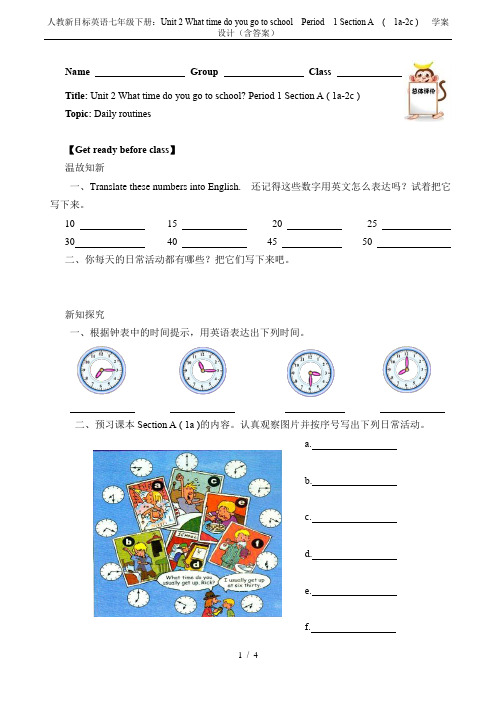
Name Group ClassTitle: Unit 2 What time do you go to school? Period 1 Section A( 1a-2c )Topic: Daily routines【Get ready before class】温故知新一、Translate these numbers into English. 还记得这些数字用英文怎么表达吗?试着把它写下来。
10 15 20 2530 40 45 50二、你每天的日常活动都有哪些?把它们写下来吧。
新知探究一、根据钟表中的时间提示,用英语表达出下列时间。
二、预习课本Section A( 1a )的内容。
认真观察图片并按序号写出下列日常活动。
a.b.c.d.e.f.三、翻译:下列句子。
1. --- What time do you usually get up, Rick?--- I usually get up at six thirty.2. 你通常什么时候洗淋浴?我通常在6:40 洗淋浴.3. ---吉姆什么时候洗淋浴?---他总是在七点洗淋浴。
四、预习指南:时间表达法1. 直接表达法:1) 用“基数词 + o'clock”(o'clock可省略)表示整点。
如:eight o'clock 八点钟,ten (o'clock) 十点钟2) 用基数词按钟点+ 分钟的顺序直接写出时间。
如:eleven five 十一点过五分,six forty六点四十2. 间接表达法1) 如果分钟数少于等于30分钟,可用“分钟+ past + 钟点”表示,如:twenty past four 四点二十2) 如果分钟数多于30分钟,可用“(60分钟-原分钟数)+ to +(原钟点数+1)”表示,其中to是介词,意思是“差”。
如:8:35 twenty-five to nine注:①当分钟数是15分钟时,可用名词quarter(一刻钟)表示。
七年级英语下册 Unit 2 What time do you go to school(Section A Grammar Focus-3c)教案 人教新目标版

Unit 2 What time do you go to schoolSection A (Grammar Focus-3c)一、教学目标:1. 语言知识目标:1) 继续学习运用when和what time引导的特殊疑问句询问时间、运用数词表达不同的时间,通过对目标语言的学习使学生学会更合理地安排自己的学习和课活动时间。
能掌握以下句型:①—What time do you usually get up? —I usually get up at six thirty.②—When do you go to work?—I usually go to work at eleven o'clock. —He's never late for school.③—When does Rick eat breakfast? —He eats breakfast at seven o'clock.④—When do your friends exercise? —They usually exercise on weekends.2. 情感态度价值观目标:通过对该部分内容的学习,让学生们学会用频率副词谈论自己日常生活及日常作息习惯;学会更合理地安排自己的学习和课外活动时间;能够运用所学知识对某一活动进行合理安排,并培养学生良好的作息习惯和守时习惯。
二、教学重难点1. 教学重点:1) 总结归纳用频率副词谈论自己日常生活及日常作息习惯的句型。
2) 通过不同形式的练习方式来训练及熟练运用用频率副词谈论自己日常生活及日常作息习惯。
2. 教学难点:1) 总结归纳用频率副词谈论自己日常生活及日常作息习惯的句型。
2) 用频率副词来造句,表达日常作息习惯。
三、教学过程Ⅰ. Warming- up and revision1. Greet the Ss and check the home.2. Let some pairs role-play the conversation in 2d.Ⅱ. Grammar Focus.1. 下面是对用频率副词谈论自己日常生活及日常作息习惯的句型进行了总结。
人教版新目标英语七年级下册《Unit 2 What time do you go to school

人教版新目标英语七年级下册《Unit 2 What time do you go to school》教学设计3一. 教材分析人教版新目标英语七年级下册《Unit 2 What time do you go to school》主要围绕着日常生活中的时间安排展开。
本节课通过学习不同的时间表达方式,使学生能够灵活运用英语询问和描述日常作息时间。
教材内容丰富,包括对话、词汇、语法及任务型活动等,旨在培养学生的听说读写技能,提高他们的语言运用能力。
二. 学情分析七年级的学生已经掌握了基本的英语语法和词汇,具备一定的听说读写能力。
他们对新知识充满好奇心,善于模仿和交流。
但同时,部分学生可能对时间表达方式的掌握还不够熟练,需要教师的引导和练习。
三. 教学目标1.知识目标:学生能够掌握日常时间表达方式,如“What time do yougo to school?”、“I go to school at 7:00.”等;2.能力目标:学生能够在实际情境中运用英语询问和描述时间;3.情感目标:培养学生珍惜时间、合理安排作息的良好习惯。
四. 教学重难点1.重点:学生能够正确使用时间表达方式进行问答;2.难点:学生能够在实际情境中灵活运用时间表达方式。
五. 教学方法1.情境教学法:通过设定真实的生活情境,让学生在实际交流中学会运用时间表达方式;2.任务型教学法:设计各种任务活动,让学生在完成任务的过程中提高语言运用能力;3.互动式教学法:引导学生积极参与课堂互动,增强学生的自信心和合作精神。
六. 教学准备1.准备教材、课件和教学资源;2.设计相关任务活动和练习题;3.准备时间表、闹钟等教具。
七. 教学过程1.导入(5分钟)利用多媒体展示不同的时间场景,如早晨起床、上学、放学等,引导学生用英语描述这些场景。
2.呈现(10分钟)教师展示教材中的对话,让学生边听边跟读,掌握日常时间表达方式。
同时,教授时间词汇如“morning”、“afternoon”、“evening”等。
人教版新目标英语七年级下册《Unit 2 What time do you go to school

人教版新目标英语七年级下册《Unit 2 What time do you go to school》优秀教学设计2一. 教材分析人教版新目标英语七年级下册《Unit 2 What time do you go to school》主要讲述了日常生活中关于时间的基本表达方式。
通过本单元的学习,学生能够掌握一般现在时态的疑问句和回答,以及询问和描述日常活动的时间。
教材以真实的生活场景为背景,让学生在实际语境中学习、练习和应用英语,提高他们的语言运用能力。
二. 学情分析七年级的学生已经掌握了基本的英语语法知识和一定数量的词汇,具备一定的听、说、读、写能力。
但部分学生对英语学习的兴趣不足,学习积极性有待提高。
此外,学生之间在学习上的差距较大,有的学生英语基础较薄弱,需要更多的关注和辅导。
三. 教学目标1.知识目标:学生能够掌握一般现在时态的疑问句和回答,正确运用动词短语描述日常活动的时间。
2.能力目标:学生能够在实际语境中听、说、读、写关于时间的表达,提高语言运用能力。
3.情感目标:激发学生学习英语的兴趣,培养他们积极向上的学习态度,增强自信心。
四. 教学重难点1.重点:学生能够运用一般现在时态的疑问句和回答,描述日常活动的时间。
2.难点:学生能够在实际语境中正确运用动词短语,灵活表达关于时间的句子。
五. 教学方法1.情境教学法:通过设定真实的生活场景,让学生在实际语境中学习、练习和应用英语。
2.交际法:鼓励学生积极参与课堂交流,提高他们的听说能力。
3.任务型教学法:通过完成具体任务,让学生在实践中掌握语言知识,提高语言运用能力。
六. 教学准备1.教师准备:备好相关教学材料,如PPT、图片、实物等。
2.学生准备:预习本节课的内容,了解一般现在时态的疑问句和回答。
七. 教学过程1.导入(5分钟)教师通过提问学生日常生活中的一些活动,如“What do you like to do in your free time?”,引导学生用英语进行回答。
人教版新目标英语七年级下册《Unit 2 What time do you go to school
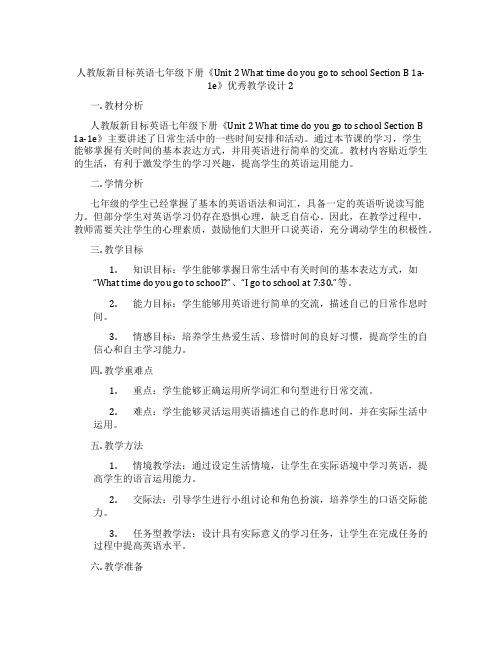
人教版新目标英语七年级下册《Unit 2 What time do you go to school Section B 1a-1e》优秀教学设计2一. 教材分析人教版新目标英语七年级下册《Unit 2 What time do you go to school Section B1a-1e》主要讲述了日常生活中的一些时间安排和活动。
通过本节课的学习,学生能够掌握有关时间的基本表达方式,并用英语进行简单的交流。
教材内容贴近学生的生活,有利于激发学生的学习兴趣,提高学生的英语运用能力。
二. 学情分析七年级的学生已经掌握了基本的英语语法和词汇,具备一定的英语听说读写能力。
但部分学生对英语学习仍存在恐惧心理,缺乏自信心。
因此,在教学过程中,教师需要关注学生的心理素质,鼓励他们大胆开口说英语,充分调动学生的积极性。
三. 教学目标1.知识目标:学生能够掌握日常生活中有关时间的基本表达方式,如“What time do you go to school?”、“I go to school at 7:30.”等。
2.能力目标:学生能够用英语进行简单的交流,描述自己的日常作息时间。
3.情感目标:培养学生热爱生活、珍惜时间的良好习惯,提高学生的自信心和自主学习能力。
四. 教学重难点1.重点:学生能够正确运用所学词汇和句型进行日常交流。
2.难点:学生能够灵活运用英语描述自己的作息时间,并在实际生活中运用。
五. 教学方法1.情境教学法:通过设定生活情境,让学生在实际语境中学习英语,提高学生的语言运用能力。
2.交际法:引导学生进行小组讨论和角色扮演,培养学生的口语交际能力。
3.任务型教学法:设计具有实际意义的学习任务,让学生在完成任务的过程中提高英语水平。
六. 教学准备1.准备相关的时间道具,如钟表、闹钟等。
2.制作课件,展示日常生活中有关时间安排的图片和场景。
3.准备小组讨论和角色扮演的活动材料。
七. 教学过程1.导入(5分钟)教师向学生展示一些时间相关的道具,如钟表、闹钟等,并提问:“Can you guess what time it is?”引导学生用英语进行回答,从而引出本节课的主题。
人教版新目标英语七年级下册《Unit 2 What time do you go to school
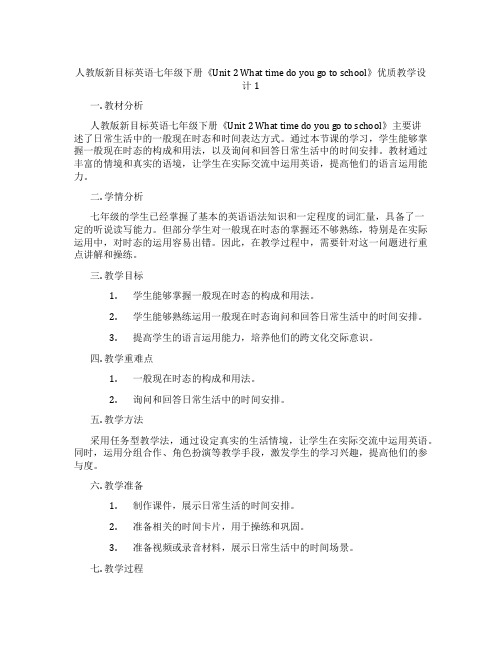
人教版新目标英语七年级下册《Unit 2 What time do you go to school》优质教学设计1一. 教材分析人教版新目标英语七年级下册《Unit 2 What time do you go to school》主要讲述了日常生活中的一般现在时态和时间表达方式。
通过本节课的学习,学生能够掌握一般现在时态的构成和用法,以及询问和回答日常生活中的时间安排。
教材通过丰富的情境和真实的语境,让学生在实际交流中运用英语,提高他们的语言运用能力。
二. 学情分析七年级的学生已经掌握了基本的英语语法知识和一定程度的词汇量,具备了一定的听说读写能力。
但部分学生对一般现在时态的掌握还不够熟练,特别是在实际运用中,对时态的运用容易出错。
因此,在教学过程中,需要针对这一问题进行重点讲解和操练。
三. 教学目标1.学生能够掌握一般现在时态的构成和用法。
2.学生能够熟练运用一般现在时态询问和回答日常生活中的时间安排。
3.提高学生的语言运用能力,培养他们的跨文化交际意识。
四. 教学重难点1.一般现在时态的构成和用法。
2.询问和回答日常生活中的时间安排。
五. 教学方法采用任务型教学法,通过设定真实的生活情境,让学生在实际交流中运用英语。
同时,运用分组合作、角色扮演等教学手段,激发学生的学习兴趣,提高他们的参与度。
六. 教学准备1.制作课件,展示日常生活的时间安排。
2.准备相关的时间卡片,用于操练和巩固。
3.准备视频或录音材料,展示日常生活中的时间场景。
七. 教学过程1.导入(5分钟)通过提问学生日常生活中的时间安排,引导学生思考和讨论。
如:“What time do you get up?”“What time do you go to school?”等。
2.呈现(10分钟)利用课件展示一般现在时态的构成和用法,同时呈现日常生活中的一般现在时态句子。
如:“I get up at 7 o’clock.”“He goes to school at 8 o’clock.”等。
(完整版)新版新目标七下Unit2Whattimedoyougotoschool知识点及习题,推荐文档

Unit 2 What time do you go to school?一、重点词汇1.词形变化:(1)d ress v.穿衣服—________n. 连衣裙—_____(复数)(2)b rush v.刷;刷净—________(三单形式)—________n.牙刷(3)t ooth n.牙齿—________(复数)(4)s how v.展示;&n.节目—________v&n.沐浴;沐浴器(5)s hower v.沐浴;洗澡=________=________(同义词)(6)f our num, 四—________十四—________四十(7)f ive num.五—________十五—________五十(8)e arly adj.&adv. 早(的),提前(的)—________(反义词)(9)s top v.&n.停止;站台=________n. 车站(近义词)(10)job n. 工作;职业=________v.&n.工作(近义词)—________n.工人(11)exercise v. &n.—________(三单形式)—________(现在分词形式)—________(不可数名词)锻炼;运动—________(可数名词复数)练习;操(12)good adj. —________adv. —________(比较级、最高级)(13)15 minutes = _________一刻钟;15分钟(同义词)(14)30 minutes =__________半小时(同义词)(15)60 minutes = _________ 一个小时(同义词)(16)run v.跑—________(现在分词)—________n.跑步者(17)clean v.打扫;清除;&adj.干净的—________adj.肮脏的(反义词)(18)walk v.&n.步行;行走=________(介词短语)(19)walk v.散步=________=________=________(同义词)(20)quick adj.快的;迅速的—________adv. 很快地—________(反义词)(21)taste v. 品尝;有……的味道;&n.味道;滋味—________adj.美味的;可口的(22)live v.生活—________n.生活;生命—________(复数形式)(23)sometimes adv.=___________有时;不时(同义词)(24)lots of 大量的;许多的=____________(同义词)(25)exercise v,锻炼;做运动=____________(同义词)(26)be late for =____________(同义词)因……而迟到(27)health n.健康—________adj.健康的—________adj.不健康的(反义词)(28)after prep.&conj.在……之后—________(反义词)2.重点单词:(1)频度副词:always, usually, often, sometimes, never等(2)e xercise的用法;(3)e ither的用法3.易错知识点(1)W hen与What time的区别运用when与what time都可以用来询问时间,相当于汉语的“什么时候”,它们之间的异同点如下:1)询问做某事的具体时间(钟点)时两者可以互换如:你什么时候去上学?— When / What time do you go to school?—I go to school at seven o’clock.2) 询问钟表所显示的时间时,只能用what timee.g. —What time is it? (=What’s the time) 几点了? —It’s eigh t thirty.八点半。
人教新目标版英语七下Unit 2《What time do you go to school》(Pe
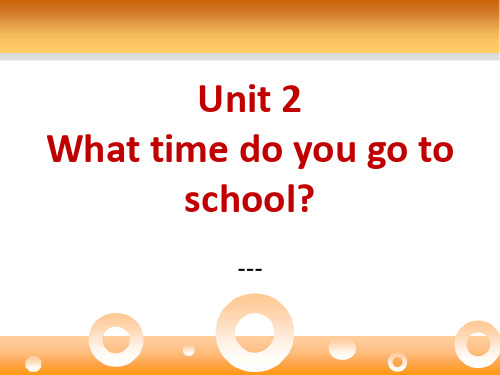
历史课件:/kejian/lish i/
___w_o_r_k______ v.& n. 工作
6. ___d_r_e_s_s____ v. 穿衣服 n. 连衣裙
7. ___e_x_e_r_c_i_s_e__ v. & n. 锻炼
预习检测
8. __b_ru_s_h______ v. 刷 n. 刷子 9. __s_h_o_w_e_r_______ n. & v. 沐浴 10. _fu__n_n_y______ adj. 滑稽好笑的 11. __e_a_rl_y______ adv.& adj. 早的 12. __u_s_u_s_a_ll_y________ adv. 通常地 13.__u_p_________ adv. 向上 14. __n_e_v_e_r_______ adv. 从不 15. __fo__rt_y__________ num. 四十 16. __f_i_ft_y________ num. 五十
化学课件:/kejian/huaxue/ 生物课件:/kejian/she ngwu/
地理课件:/kejian/dili/
历史课件:/kejian/lish i/
____g_e_t_d_r_e_s_s_e_d_____
19. 起床 ______g_e_t_u_p_____
20. 刷牙 ___b_ru_s_h__t_e_e_th________
21. 吃早餐 ____e_a_t_b_r_e_a_k_f_a_s_t_____
22. 去上学 ___g_o_t_o_s_c_h__o_o_l
预习检测
三、请认真阅读2d对话,翻译下列句子。 23. 他在一家电台工作。(work at) _H_e__w_o_r_k_s_a_t__a_r_a_d_io__s_t_a_ti_o_n_._______________ 24. 你通常几点起床? (get up) _W__h_a_t_t_im__e_d_o__y_o_u__u_s_u_a_ll_y_g_e_t__u_p_?__________ 25. 那个时间吃早饭真有意思哦!(...time for...)
人教新目标英语七年级下册:Unit 2 What time do you go to school?
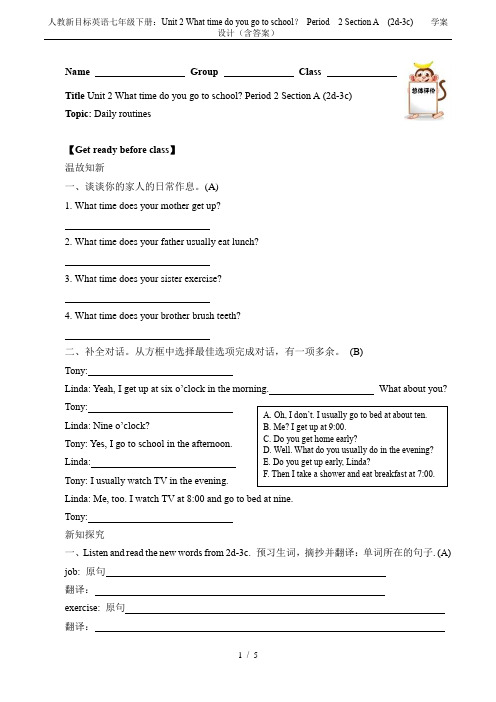
Name Group ClassTitle Unit 2 What time do you go to school? Period 2 Section A (2d-3c) Topic: Daily routines【Get ready before class 】 温故知新一、谈谈你的家人的日常作息。
(A)1. What time does your mother get up?2. What time does your father usually eat lunch?3. What time does your sister exercise?4. What time does your brother brush teeth?二、补全对话。
从方框中选择最佳选项完成对话,有一项多余。
(B)Tony:Linda: Yeah, I get up at six o’clock in the morning. What about you?Tony:Linda: Nine o’clock?Tony: Yes, I go to school in the afternoon.Linda:Tony: I usually watch TV in the evening. Linda: Me, too. I watch TV at 8:00 and go to bed at nine.Tony:新知探究一、Listen and read the new words from 2d-3c. 预习生词,摘抄并翻译:单词所在的句子. (A)job: 原句翻译:exercise: 原句 翻译:A. Oh, I don’t. I usually go to bed at about ten.B. Me? I get up at 9:00.C. Do you get home early?D. Well. What do you usually do in the evening?E. Do you get up early, Linda?F. Then I take a shower and eat breakfast at 7:00.best: 原句翻译:group: 原句翻译:三、预习指南:1. job与work辨析:job是可数名词,主要指有报酬的工作;work是不可数名词,主要指要付出努力的劳动1) Bob wants to find a good . 鲍勃想找一份好的工作。
人教版新目标版七年级英语下册 Unit 2 What time do you go to school period 3教案
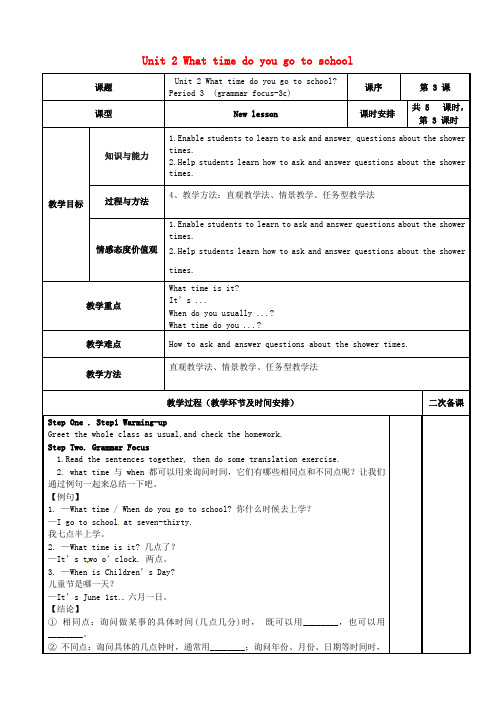
Unit 2 What time do you go to school课题Unit 2 What time do you go to school?Period 3 (grammar focus-3c)课序第 3 课课型New lesson 课时安排共 5 课时,第 3 课时教学目标知识与能力1.Enable students to learn to ask and answer questions about the showertimes.2.Help students learn how to ask and answer questions about the showertimes.过程与方法4、教学方法:直观教学法、情景教学、任务型教学法情感态度价值观1.Enable students to learn to ask and answer questions about the showertimes.2.Help students learn how to ask and answer questions about the showertimes.教学重点What time is it?It’s ...When do you usually ...?What time do you ...?教学难点How to ask and answer questions about the shower times.教学方法直观教学法、情景教学、任务型教学法教学过程(教学环节及时间安排)二次备课Step One . Step1 Warming-upGreet the whole class as usual,and check the homework.Step Two. Grammar Focus1.Read the sentences together, then do some translation exercise.2. what time 与when 都可以用来询问时间,它们有哪些相同点和不同点呢?让我们通过例句一起来总结一下吧。
人教新目标英语七年级下册:Unit 2 What time do you go to school?

Name Group ClassTitle: Unit 2 What time do you go to school? Period 5 RevisionTopic: Daily routines【Get ready before class】单元知识梳理1. what time与when的区别1)what time 用来询问具体的时刻。
2)when 可以用来询问年、月、日,也可以对具体的时间进行提问。
你早上几点锻炼?你的生日是什么时候?2. 时间的表达法1) 如果时间是整点,直接用钟点数或钟点数后加o’clock. 如:9:00表示为2) 如果时间是“整点+分钟”,而且分钟数小于或等于30分钟,直接用数字表达,也可以用:“分钟数+past+钟点数”。
如:10:10表示为或3) 如果时间是“整点+分钟”,而且分钟数大于30分钟,直接用数字表达,也可以用:“(60—分钟数)+ to +下一个钟点数”。
如:2:40表示为或3. work和job的区别1) work是不可数名词,主要是指要付出努力的劳动。
2) job是可数名词,主要是指有报酬的工作。
我今天有很多工作要做。
I have a lot of to do today.我想找一份好工作。
I want to find a good .4. either 作副词,意为“或者”,常见的搭配为either…or…我要么看电视要么玩电脑游戏。
5. either , too 与also1) either作“也”讲,一般只用于否定句句末。
2)too通常放在肯定句句末。
3)also 通常放在句中。
我也喜欢香蕉。
I like bananas.Mike也不喜欢踢足球。
Mike doesn’t like soccer见到你也很开心。
Nice to meet you, .6. exercise 的用法:1) 作动词,意为“锻炼”。
如:我常常在早晨锻炼。
I often in the morning.2) 作名词,作“锻炼、运动”讲,不可数名词;作“体操、练习”讲,为可数名词。
人教版新目标七年级下册Unit 2 What time do you go to school_un
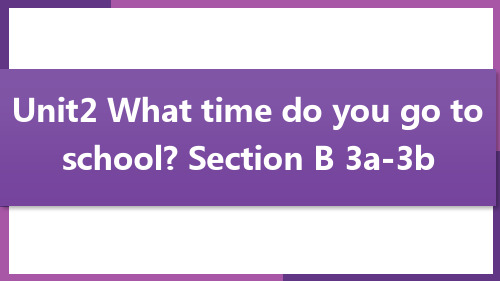
思路点拨
My School Day
早晨情况 上午上学情况 中午情况 下午上学情况 放学后的情况
Choose the words about time.
___ I have lunch at a quarter to twelve. ___ I get home from school at half past four and do my homework. _1__ I have a very healthy life. ___ I have dinner at seven thirty. ___ I go to bed at ten.
Unit2 What time do you go to school? Section B 3a-3b
Revision
1.起床;站起___g_e_t _u_p____ 2.健康的生活__a_h_e_a_l_th_y__li_fe_____ 3.穿上衣服__g_e_t_d_r_e_s_se_d______ 4.刷牙__b_r_u_s_h_t_e_e_th______ 5.吃早餐__e_a_t/_h_a_v_e_b_r_ea_k_f_a_s_t _____
GOOD JOB
homework. _1__ I have a very healthy life. _8__ I have dinner at seven thirty. _9__ I go to bed at ten.
A story about a daily routine.
- 1、下载文档前请自行甄别文档内容的完整性,平台不提供额外的编辑、内容补充、找答案等附加服务。
- 2、"仅部分预览"的文档,不可在线预览部分如存在完整性等问题,可反馈申请退款(可完整预览的文档不适用该条件!)。
- 3、如文档侵犯您的权益,请联系客服反馈,我们会尽快为您处理(人工客服工作时间:9:00-18:30)。
新目标版英语七年级下册Unit 2 What time do you go to school?(Section A)一、根据句意及首字母提示完成句子1、根据句意及首字母提示完成句子(1)Tom is very young. He can't get d________ by himself(他自己).(2)Jim is seven years old. He can b________ his teeth in the morning.(3)—What's ten and thirty?—It's f________.(4)I always get up e________. I never get up late.(5)There are many(许多的)buses(公共汽车)at the bus s________.二、用所给词的适当形式填空2、用所给词的适当形式填空(1)—What time do you usually________ (eat) breakfast?—At seven thirty.(2)“That's a ________ (fun) time for breakfast.(3)________ (Lily) family has a cat. It's very interesting.(4)Jim usually ________ (do) his homework after school.(5)He ________ (brush) his teeth after he gets up every morning.三、从方框中选择合适的单词并用其正确形式完成句子3、从方框中选择合适的单词并用其正确形式完成句子(1)What do you ________ do on Sundays?(2)I ________ walk to school when it's sunny.(3)My father gets up early every day, so he is ________ late for work.(4)The sun(太阳) ________ rises(升起) in the east(东方) and sets in the west.(5)Tina finds a good ________. She ________ very hard (努力地) every day.(6)Mary wants to be a singer. She thinks it's an interesting ________.四、单选题4、Li Ming is the best student in our class. He __________ gets good grades(成绩).A、alwaysB、sometimes(有时)C、neverD、often5、Cathy was born blind(天生是盲的), so she has __________ seen our beautiful world.A、oftenB、sometimesC、seldom(很少)D、never6、My father, Mr. White, often __________ at six twenty in the morning.A、get upB、go upC、gets upD、go to bed7、Kate takes a shower at 8 o'clock in the evening.(替换画线部分)A、playsB、lovesC、hasD、brings8、—Do you like this movie?—Yes, it's the __________ one I've ever seen(曾经看过的).A、betterB、bestC、goodD、well9、—When do you go to school?—We go to school __________ Monday __________ Friday.A、on; toB、from, toC、in; andD、in, to10、Could I have an early morning call __________ six o'clock tomorrow(明天) ?A、onB、toC、atD、in11、The child doesn't need any help. He is old enough to __________ himself.A、put onB、wearC、dressD、take care12、__________ your father __________ watching TV in the evening?A、Does, likesB、Does, likeC、Is; LikesD、Do, likes13、Susan __________ her homework at school every weekend.A、don'tB、don't doC、doesn'tD、doesn't do五、按要求改写句子14、按要求改写句子(1)He wants to know about my weekend.(改为一般疑问句并作否定回答)________ he ________ to know about your weekend?No, he ________.(2)She goes to school at seven thirty.(改为否定句)She ________ ________to school at seven thirty.(3)She often has dinner at half past six in the evening(对画线部分提问)________ ________ does she often have dinner in the evening?(4)I take a shower at 8:00 in the morning.(对画线部分提问)________ ________ you ________ a shower in the morning?(5)I usually learn English at eight on the radio.(用he代替I改写句子)He ________ ________ English at eight on the radio.六、根据汉语完成句子15、根据汉语完成句子(1)—你几点钟锻炼?—我通常五点五十锻炼。
—________ ________ do you ________?—I usually ________ ________ ________ ________.(2)我妈妈通常六点起床并刷牙。
My mum usually ________ ________ at six ________ and ________ her ________.(3)有五个人晚上在广播电台工作。
Five people ________ at the ________ ________ at ________.(4)他通常放学后踢足球。
He ________ ________ soccer ________ school.七、从方框中选择合适的单词或短语完成句子16、从方框中选择合适的单词或短语完成句子(1)—________ do you go swimming in July?—On Sunday.(2)—________ does your father go to work?—At seven in the morning.(3)She is very outgoing(外向的). She is ________ smiling.(4)My uncle is very lazy(懒惰的). He ________ exercises.(5)I ________ get dressed at six twenty in the morning.八、补全对话17、补全对话Interviewer: Deng Li has an interesting job. She works in a school in Hubei. Deng Li is one of the most beautiful countryside teachers(最美乡村教师之一) in 2015.(1)________Deng Li: From six o'clock every morning to five in the afternoon.Interviewer:(2)________Deng Li: At five.Interviewer:(3)________Deng Li: A little. But I am happy.Interviewer:(4)________Deng Li: Yes, I am. I am always good with them.Interviewer:(5)________Deng Li: Yes, I like it very much.九、完形填空答案解析部分一、根据句意及首字母提示完成句子1、【答案】(1)dressed(2)brush(3)forty(4)early(5)station【解析】【分析】(1)get dressed 穿衣服;句意:Tom还小,他自己还不会穿衣服。
(2)考查短语识记。
brush one's teeth 刷牙;句意:Jim七岁了,他早上会自己刷牙了。
(3)句意:—10加30是多少?—40。
(4)考查形容词;句意:我总是早起,我从来没有迟到。
根据后文的从来没有迟到,可以得知,我早起了(early)。
(5)考查固定词组;bus station 汽车站。
句意:在汽车站有很多(许多)公共汽车。
二、用所给词的适当形式填空2、【答案】(1)eat(2)funny(3)Lily's(4)does(5)brushes【解析】【分析】(1)考查一般现在时态;句意:—你一般是几点吃早餐的?—7点30。
前面已经出现了助动词do,因此填入原形。
(2)funny有趣的。
句意:那时候吃早餐太搞笑(funny)了。
(3)考查名词所有格作定语;句意:Lily家有一只猫。
